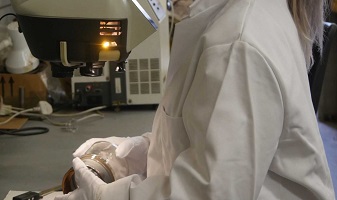Glass manufacturing is a complex process that involves a variety of potentially hazardous activities, such as working with high temperatures, handling heavy materials, and operating complex machinery.
At Moore’s Glassworks, we put the safety of our workforce first, and that’s why we have many procedures in place that are there solely for this reason.
It’s important for glass manufacturers to prioritize safety and take steps to prevent workplace accidents.
And with that in mind, here’s a guide on 7 steps you can take to ensure your glass manufacturing factory is safe.
Let’s take a look.
7 Practices for Preventing Accidents in Glass Manufacturing
Conduct Regular Safety Training
One of the best ways to prevent workplace accidents is to provide employees with comprehensive safety training.
There are many things that someone working within a glass manufacturing environment should be trained on, but some topics that you should focus primarily on are information on the hazards associated with glass manufacturing such as burns and injuries handling heavy objects, as well as best practices for working safely in the factory.
Training should be provided to all new employees and should be repeated periodically to ensure that everyone stays up to date with the latest safety protocols. At least once a year is a good benchmark to try and stick to to always have a workforce that is in the know.
Provide Personal Protective Equipment (PPE)
Employees who work in the glass manufacturing industry should be provided with appropriate PPE, such as safety glasses, heat-resistant gloves, and steel-toed boots.
It’s important to ensure that PPE fits properly and is in good condition to provide maximum protection.
This isn’t a point that can be passed over, and having proper PPE in place that the workforce are told they must use is absolutely vital.
Regularly Inspect and Maintain Machinery
Machinery and equipment used in glass manufacturing should be regularly inspected and maintained to ensure that they are in good working condition. Faulty equipment should be repaired or replaced immediately to prevent accidents.
Here at Moore’s Glassworks, we have auto-lathes in place that can make the glass manufacturing process much more efficient and accurate. These are complex machines, and must be treated as such. All staff that use heavy duty equipment should be well trained on the machine in question, and the machine should always be serviced and checked so that is in perfect condition.
Not only does this keep it safe, but it will also ensure it is running at full efficiency and not costing your company energy and money.
Implement Safe Working Procedures
All glass manufacturing processes should be designed with safety in mind.
This may include creating safe working procedures for specific tasks, such as handling molten glass or operating machinery. These procedures should be regularly reviewed and updated as needed to reflect changes in equipment or processes.
Having processes in place is a great way of ensuring all of your staff are reading from the same hymn sheet and know the exact way to use a piece of machinery or handle a process without putting themselves, or their fellow staff members, at risk.
Encourage Reporting of Near Misses and Incidents
Encouraging employees to report near misses and incidents is a key component of accident prevention.
This allows the company to identify potential hazards and take steps to mitigate them before an accident occurs. For example, if there has been several near misses on a single piece of equipment within a month or so, this is a clear sign that something isn’t right, and by spotting this early and repairing any faults you are minimising the chance of an accident taking place.
Also, if there is a system of work in place that isn’t quite right, and incidents are occurring, this is a sign that a new process needs to be created and spread to your clients.
Conduct Regular Safety Audits
Regular safety audits can help identify potential hazards and provide feedback on the effectiveness of safety measures.
These audits should be conducted by an independent third-party to ensure objectivity and impartiality.
What this means is bringing in a fresh pair of eyes who can perform a complete assessment of your workplace. This may involve testing your machinery, looking through your safe working procedures, speaking to your staff and more. It can be easy to fall into bad habits, so by letting a third party come in you may spot some things that had passed you by and may be putting your workforce at risk.
Foster a Safety Culture
Creating a safety culture that values and prioritizes safety can go a long way in preventing accidents.
This involves encouraging employees to take ownership of safety and empowering them to report hazards and suggest safety improvements.
Your staff are the people that are on the factory floor, using the machinery and working with the glass. They are the ones putting themselves at risk, and the ones who will be best placed to spot any potential hazards. Having an environment where a safety first attitude is rewarded is ideal for keeping on top of any issues.
Safe Glass Manufacturing with Moore’s Glassworks
Safety is a critical consideration for glass manufacturers, and preventing workplace accidents requires a multi-faceted approach.
By implementing these best practices, glass manufacturers can reduce the risk of accidents and create a safer, more productive workplace for their employees.
At Moore’s Glassworks, we take the safety of our employees very safely. All of our staff are well trained in more than just glass manufacturing, and know the best procedures for staying safe whilst at work.
Want to know more, or need to speak to us about a project for your business?


Leave a Reply